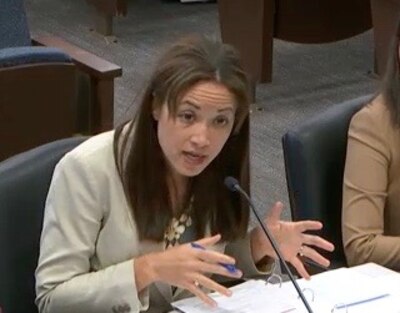Just when Tennessee appeared to be settling into the idea of creating its second voucher program following a bitter legislative battle last spring, a new round of controversy has erupted over whether those education funds can be taxed.
That question — highlighted in a budget hearing last month during a brief exchange between lawmakers and Education Commissioner Penny Schwinn — points to a gray area as more states embrace education savings accounts. A newer type of voucher that polls better among voters, the program lets qualifying families use their state-funded education dollars to pay for private school tuition, tutoring, online learning programs, and other private services for students.
Unlike a traditional voucher, education savings accounts can cover more than just the tuition and fees that could be considered a non-taxable scholarship.
The Education Commission of the States, a nonprofit organization that tracks state education policies and advises lawmakers across America, has not reached a conclusion about the tax implications for families who participate.
“We simply do not know at this point,” said Sharmila Mann, the commission’s policy director.
Adding to the confusion, six states that have created education savings account programs have taken different approaches.
Florida, considered a national leader in spawning programs that give parents more education choices, has declared the money in its education savings account program tax free. Its managers do not report those disbursements to the Internal Revenue Service.
“The federal government doesn’t tax you on money that’s spent for your child to go to a public school, so I don’t see why it would be any different when the state sets aside a bank account for a family to pay for private education services,” said Patrick Gibbons, a spokesman for Step up for Students, one of two nonprofit groups that manage Florida’s programs.
By contrast, North Carolina, which launched its program last year, reports the income to federal officials — but only after subtracting what was spent for private tuition and fees.
Meanwhile, Tennessee’s first voucher program — known as Individualized Education Accounts for students with disabilities — has taken a conservative approach. The state’s education department has reported each recipient’s entire payment to the IRS, no matter how the money is spent.
Under former Gov. Bill Haslam’s administration, Tennessee officials steered clear of commenting on the taxability of state funds provided to families through education savings accounts.
“Consult your tax professional,” parents were told by staff at the state education department, who also referred families to an 86-page IRS document.
That approach changed several weeks ago when Schwinn responded to a question by House Minority Leader Karen Camper about the taxability of $7,000-plus payments expected to be distributed to up to 5,000 families beginning next year under Tennessee’s second education savings account program.

“My understanding is this is taxable, yes,” Schwinn answered.
Gov. Bill Lee’s office quickly retracted her statement. Any money distributed through the program will be considered a scholarship, said the governor’s staff, and therefore not subject to taxation.
Soon after, Sen. Raumesh Akbari called on the Republican governor and legislature to pause the program’s launch until the question can be definitively answered, especially since Lee has ordered its start a year earlier than required under a new state law.
Akbari argued that the stakes will be higher with Tennessee’s new program because — unlike most education savings account programs that serve students with disabilities — this version will target a general population of low-income families in Memphis and Nashville. The extra money, if declared taxable income, could end up increasing taxes paid by participating families, bump them into a higher bracket, or push them off of government programs like health insurance for Medicaid recipients.
“There’s no reason to force this program into existence a year early if the end result hurts the very families it is supposed to help.” said Akbari, a Memphis Democrat who voted against the governor’s signature education initiative.
But the program’s supporters don’t see that happening.
“While the federal government is not real clear on the tax issue, similar bills have been passed in other states and there hasn’t been a problem,” said Rep. Mark White, a Memphis Republican who chairs the House Education Committee and voted for the bill.
Next steps now rest in the offices of Tennessee’s governor and his finance commissioner, Stuart McWhorter.
“As we continue the rulemaking process, the department intends to structure the program [as a scholarship initiative] and is seeking additional guidance to ensure that outcome,” a spokeswoman said this week.
It’s uncertain whether the law will have to be tweaked, or whether the state will revise its reporting processes for education savings account income based on the two states that it’s studied the most. Tennessee could opt to side with Florida and not report the money to the IRS for either of its programs. Or, it could follow North Carolina’s lead and still report distributions — but minus whatever was spent on tuition and fees.
The way Nashville accountant Geoffrey Stewart reads federal tax code, any remaining taxable income would be small, if at all, since the bulk is expected to go toward private school expenses.
“These accounts are a lot like when college kids get a scholarship. That’s not taxable income either,” said Stewart, who chairs the federal tax liaison committee for the Tennessee Society of Certified Public Accountants. “This is basically putting non-college education scholarships on the same footing as college scholarships.”

